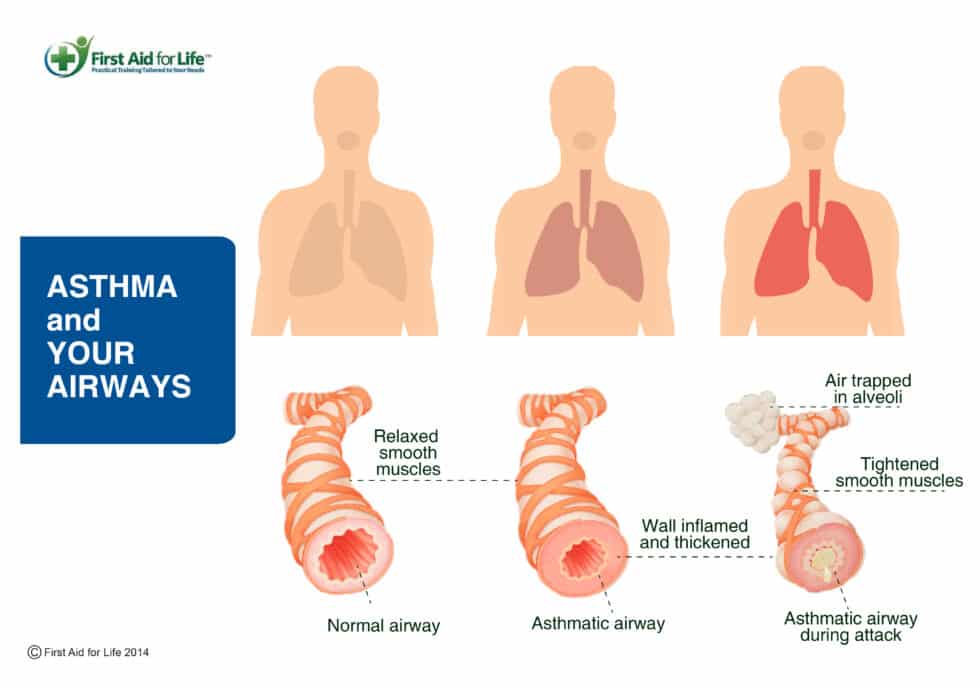When pupils return to school in September there is a steep rise in children hospitalised with asthma attacks. In the UK a child is admitted to hospital every 20 minutes because of an asthma attack. However, the number of children needing emergency treatment doubles in September compared to August.
So why should children settling back into school find their asthma suddenly becomes unstable? And how can parents help?

There are 1.1 million children in the UK with asthma. Each classroom in the UK has on average three children suffering from asthma. Surveys show around two thirds of them will have an asthma attack during the school day. The so-called ‘September Surge’ could be due to several factors:
- Exposure to cold and flu viruses, which are known triggers of asthma attacks
- The onset of cooler, damp autumn weather
- Reduced use of inhalers over the summer holidays leading to a fall in the protective benefits on the child’s airways
- Big emotions – excitement, anxiety or stress can trigger asthma symptoms
- New schools, teachers and routines, and increasing stress for children at the start of term
- Schools asthma management and whether the child has immediate access to their inhaler if they need it
- Increase in activity compared to the summer holidays.
Here are our top seven tips to helping your child avoid the asthma spike:
- Help your child to establish and keep a regular routine using their preventer inhalers over the summer months in preparation for September.
- Ensure your child is competent at using their own inhalers properly, using spacers if appropriate. Videos are a useful tool to give a visual demonstration of how to use their inhaler.
- Help your child prepare a Personalised Asthma Action Plan (PAAP) with their asthma nurse or GP. Less than 25% of children with asthma have a Personalised Asthma Action Plan. Research shows children without a PAAP are four times more likely to end up in hospital than those with one.
- If your child has a PAAP share a copy with the school and at any activity clubs your child attends.
- Store a copy of it on your phone so you can share it with any caregivers, friends or family who may look after your child. A Personalised Asthma Action Plan contains information on triggers, how and when to take the preventers and relievers, how to spot asthma worsening, indicators that their asthma may be becoming unstable and a clear action plan in the case of an asthma attack.
- Before the end of summer rush, book an appointment to review your child’s reliever inhaler prescription so they have a full and functioning inhaler for the new school year.
Provide your school with a spare so your child can receive their medication even if they forget their own inhaler. (Schools are now able to buy a spare reliever inhaler and spacer for emergencies for any asthmatic children within the school that need one)
Spotting the signs
Finally, understand the early warning signs your child could be more likely to have an asthma attack, as spotting these signs could help avoid it.
Asthma nurses report the following warning signs could indicate that someone’s asthma is becoming unstable:
Using the reliever inhaler three or more times a week
Finding that the reliever inhaler is not controlling symptoms for more than 4 hours
Coughing or wheezing at night or in the morning
Breathlessness when talking
Struggling to keep up with friends, because of breathlessness
Developing a cold or being exposed to flu like symptoms
Spotting these early signs and getting additional help and support from the GP or Asthma nurse, should hopefully swerve the September Surge.
Emma Hammett is the CEO and Founder of First Aid for Life. First Aid for Life is an Award Winning fully regulated First Aid Training business, our trainers are extremely experienced medical and emergency services professionals and our training is tailored to your needs.
We give people the skills and confidence to help in an emergency.
Emma Hammett is a First Aid expert and is regularly contacted as a spokesperson for SKY News and the BBC, she is the First Aid expert for Mothercare.
First Aid for life provides this information for guidance and it is not in any way a substitute for medical advice. First Aid for Life is not responsible or liable for any diagnosis made, or actions taken based on this information. The best way to be prepared for action in an emergency is to attend a practical First Aid course.
For more information please visit: www.firstaidforlife.org.uk or contact emma@firstaidforlife.org.uk 0208 675 4036


